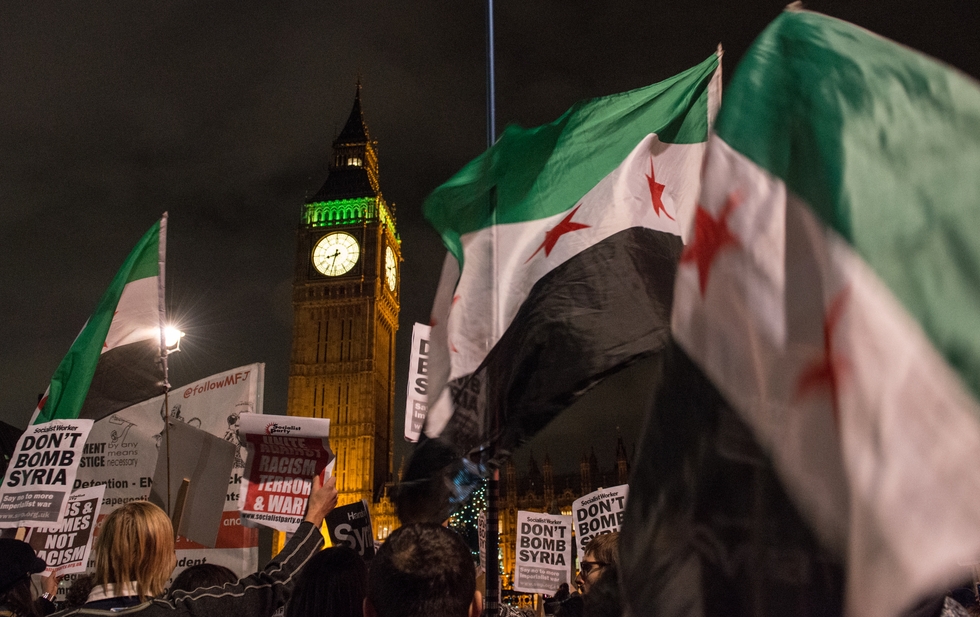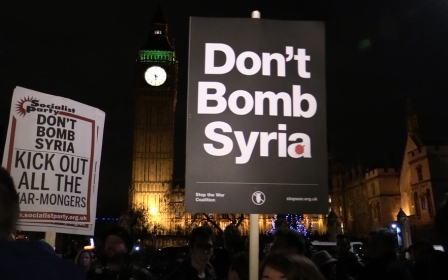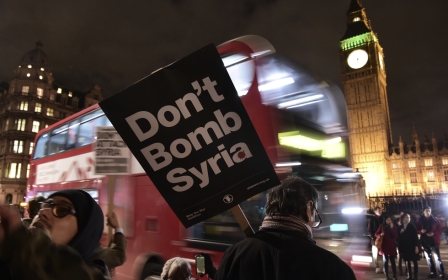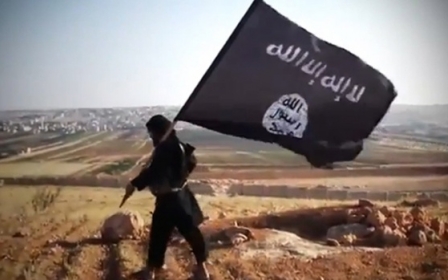British MPs authorise bombing against IS in Syria

The British parliament has voted to extend the UK's bombing campaign against the Islamic State (IS) group to Syria, with a large majority of MPs agreeing with the Conservative Prime Minister's argument that bombing was the "best" way to fight terrorism.
The vote on Wednesday evening means bombing could begin within days - with some reports saying as early as Thursday - as British forces pick targets in Raqqa, the de facto headquarters of IS, and other territory the group holds in Syria.
MPs backed David Cameron's plans 397 to 223, a majority of 174. The number of those in favour are believed to have been boosted by a large contingent of Labour MPs who had rejected leader Jeremy Corbyn's opposition to extending the RAF's campaign.
Reports said that up to 67 Labour MPs voted for the motion, a significant number but down on a feared 100 reported to be in favour on Tuesday. The Conservatives said seven of their MPs voted against, while seven abstained.
US President Barack Obama hailed the UK vote. In a statement that also praised a German government decision to provide 1,200 military personnel to support the fight against IS, Obama praised a "special relationship" with Britain "rooted in our shared values and mutual commitment to global peace, prosperity, and security".
"Since the beginning of the counter-ISIL campaign the United Kingdom has been one of our most valued partners in fighting ISIL," Obama said in a statement, using another name for IS.
"We look forward to having British forces flying with the coalition over Syria and will work to integrate them into our Coalition Air Tasking Orders as quickly as possible."
As noisy anti-war protests took place around parliament on Wednesday, the 10-hour debate inside was charaterised by fierce clashes, including between Cameron and Corbyn. The speeches from Labour MPs granted a free vote over the bombing raids were also sharply divided.
Fierce debate
Cameron opened with a response to those opposed to strikes. "Let's be clear," he said. "Inaction does not amount to a strategy for our security or for the Syrian people but inaction is a choice. I believe it's the wrong choice. The question before the House today is how we keep the British people safe from the threat posed by ISIL. This is not about whether we want to fight terrorism, it's about how best we do that."
He said he appreciated that there must be a comprehensive strategy in place - not just air strikes.
"That also includes political, diplomatic and humanitarian action. And I know that the long term solution in Syria - as in Iraq - must ultimately be a government that represents all of its people, and one that can work with us to defeat the evil organisation of ISIL for good.
"But there is a simple question at the heart of the debate today. We face a fundamental threat to our security. ISIL have brutally murdered British hostages. They’ve inspired the worst terrorist attack against British people since 7/7 on the beaches of Tunisia, and they’ve plotted atrocity after atrocity on the streets here at home.
"Since November last year our security services have foiled no fewer than seven different plots against our people. So this threat is very real."
However, there was much scrutiny of Cameron's argument.
Running through the debate were questions about the claim by Cameron that there were 70,000 "moderate" fighters able to take on IS on the ground. Corbyn led the charge, warning against an "ill-thought-out rush to war" and saying that Cameron's arguments for military action "simply do not stack up".
The claim had also earlier been questioned by the Foreign Affairs Committee, which passed a motion by majority that said Cameron had not presented a convincing case for strikes in Syria.
Julian Lewis, Tory chairman of the Commons defence select committee compared the claim to poor intelligence before the invasion of Iraq in 2003: "Instead of having dodgy dossiers, we now have bogus battalions of moderate fighters."
Martin Vickers, a Conservative MP, said he had “deeply-held reservations" about the motion, and questioned his party leader's talk of 70,000 moderate fighters.
Cameron was also criticised for telling backbenchers on Tuesday that voting against the motion would be an alignment with Corbyn and "terrorist sympathisers". He did not apologise in the debate, despite several calls for him to do so.
Beckett's case for war
The motion rested on the number of Labour MPs who were in favour. Margarett Beckett, the former Labour deputy leader, gave an impassioned case for bombing, in a speech which many commentators said was one of the day's highlights.
"The proposal before us amounts only to a relatively minor extension of action we are already undertaking," she said. "Serious questions are being raised, and I respect those who raise them."
"Would we make ourselves a bigger target for Daesh (IS) attack? We are a target. We will remain a target. There's no need to wonder about – Daesh has told us so and continues to tell us so every day that passes.
"The United Nations calls on member states to act now. Moreover, our French allies have explicitly asked us for such support. What would [we] say if what took place in Paris had happened in London, if we had explicitly asked France for support, and France had refused.
"It is the urgings of the United Nations and of the socialist government in France that, for me, have been the tipping point in my decision to support military action."
The opposition ended the debate with a speech from Shadow Foreign Secretary Hilary Benn in support of air strikes, hours after his leader opposed them.
"The question that confronts us is at its heart is very simple: What should we do to confront this threat against our citizens? Paris could easily have been London, or Glasgow, or Manchester, and still could be.
"We have a moral and practical duty to extend action to Syria. We have clear and unambiguous UN resolution, paragraph five of which states [we must] take all necessary measures. The UN asks us to do something now. To act in Syria as well as in Iraq.
"We know they are plotting more attacks. Can we really stand aside? Can we leave to others ... our national security.
"Of course air strikes alone will not defeat Daesh. But they make a difference. It makes it more difficult for them to expand their territory. Unlike Daesh, none of us act with the intent to harm civilians. We act to protect civilians from Daesh.
"Fascists need to be defeated. This entire house stood up against Hitler and Mussolini. We must now confront this evil, [and] do our bit in Syria."
The speech received an uproar of applause.
Benn did however criticise Cameron for his "terrorist sympathisers" comment. "Jeremy Corbyn ... is an honest, a principled, a decent and a good man and I think the Prime Minister must now regret what he said yesterday and his failure to do what he should have done today - which is to simply say 'I am sorry'."
Closing the debate, Philip Hammond, the foreign secretary, said it was clear that Britain must act to protect British citizens, and brushed aside criticism of Cameron's claims of 70,000 moderate fighters.
"There will need to be a ground assault on Raqqa, but that won't come in days or weeks - that will come in months or even years. Where are the ground forces to come from? The context of this is a comprehensive strategy. The time for taking Raqqa will come when the civil war is ended, and so that the Syrian army, the Syrian rebel forces, the Kurdish forces can take back [IS-held territory].
"The number is corroborated by the US. There is a spectrum of views in that force. Yes, it includes Islamists. But there are Islamists in the parliaments of Kuwait and Tunisia. We can work with Islamists who agree to take part in the democratic process.
"This is not a fight we chose. ISIL made that choice for us. ISIL do represent a direct and imminent threat to Britain. Do we strike in Syria or wait for them to strike in London. What kind of a country would we be if we refused to act... if we were unmoved by the rape and the murder that Isil imposes on its people?
"We cannot contract out responsibility for our national security. The moral imperitive to act is compelling. Let us show beyond doubt what kind of country we are by endorsing this motion."
The prime minister also used the debate to announce a comprehensive review to root out any remaining funding of extremism in the UK and "examine specifically the nature, scale and origin of the funding of Islamist extremism activity in the UK".
Air strikes 'can be highly effective'
Commentators earlier gave their views to Middle East Eye.
Hayder al-Khoei, an associate fellow at Chatham House, said that air strikes had been highly effective in Iraq and that it made sense for the UK to join in in Syria.
"Air strikes were crucial in saving the Kurdish regional capital Erbil. Air strikes played a very key if not decisive role in the liberation of Tikrit, in the liberation of Sinjar, in the liberation of Amerli, so several Iraqi cities since last summer have been liberated by both the Kurdish and Iraqi government forces.
However, he noted: "Air strikes are not going to dislodge them from the big cities they control. Air strikes are not going to be effective as these are large urban populated areas, there are going to be many civilian casualties if air strikes are conducted against them.”
Harry Leslie Smith, a 92-year-old World War II veteran who has written on his experiences, however said that he feared a bloodbath and that a proper debate was impossible when the prime minister called his opponents “terrorist sympathisers”.
“I find the words very disturbing and are more in keeping with a tin-pot dictator than a British prime minister," he told Middle East Eye.
“The last thing we need is a prime minister who only understands history as a glorious battleground. It’s always the people who take the brunt when a war is declared by a government. The young people are sacrificed to give pride to our rulers who can’t solve anything by debate."
MEE staff and agencies contributed to this report.
New MEE newsletter: Jerusalem Dispatch
Sign up to get the latest insights and analysis on Israel-Palestine, alongside Turkey Unpacked and other MEE newsletters
Middle East Eye delivers independent and unrivalled coverage and analysis of the Middle East, North Africa and beyond. To learn more about republishing this content and the associated fees, please fill out this form. More about MEE can be found here.




